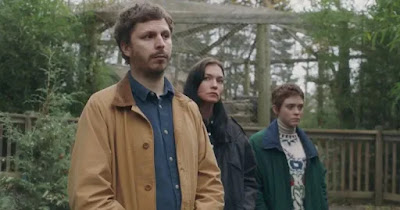Maggie has dropped out of college with little idea of what to do now while Rachel has a public radio job and suffers from depression, but the details of Eric’s life are minimal. That is by design. The one thing we learn about him, that he plays poker, often for big money, becomes a virtual extension of not just the poker face he puts up in terms of his own personal identity but his penchant for performance at the poker table itself. Rather than play silently, he talks non-stop, needling and nudging other players, partly as a way to decipher their tendencies and call their bluffs but more from his own aching need for a platform, brought home in one mid-game monologue that concludes with fake tears. He may as well be auditioning as much as he is playing poker. The climactic contest, of sorts, in which another player confronts him afterwards, then becomes so much more, the threat of an unseen gun becoming either a performance that Eric can’t match or a reality he can’t handle. Both, really.
Eric’s performative mask also takes the form of impressions, like one of the animated sitcom character Marge Simpson, which he calls up when challenged or, in one instance, when he wants to ask real questions of his sister that he can’t quite bring himself to ask in his own voice. It suggests Michael Winterbottom’s “The Trip” series (somewhere, Rob Brydon is still doing celebrity impressions), though imbued with much less comedian flop sweat as Cera has a surer grasp of both the insecurity burbling beneath and the pointed irksomeness, ably assisted in this regard by Gross. Though the one scene we see of her at work is a little too on the nose in conveying her lack of sentimentality, Gross’s turn effects an agreeable bluntness all on its own. In a walk and talk sequence in the woods, a brief look exchanged between Gross and Cera, in her glare and his emotional recoil, the physical space between the two characters becomes supercharged by the gulf of so many unspoken realities between them.
Given that Cera gets the most screen time, and serves as an executive producer, “The Adults” can sometimes feel like his movie, but as that scene between he and Gross suggests, it just as attuned to the crucial sibling relationship. Late in the movie, at a small house party, as the trio converses with another character, when that character suddenly excuses herself, in the air of Cera, Gross, and Lillis and the way Defa positions them, you can feel three people alone in their togetherness and yet all each one of them has. Their bond is finally reaffirmed during an ensuing dance routine, one we do not need to be explicitly told stems from their youth because innately we know that it does, to a song about stepping into the unknown mirroring their own journey, as if upon ending, it draws the curtain on childhood.




No comments:
Post a Comment